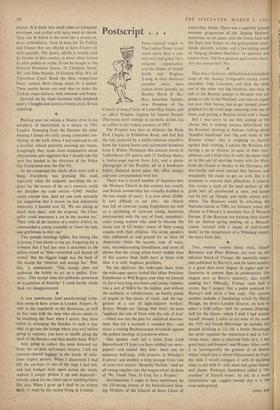Postscript . .
FROM covered wagon to The Carlton Tower in not much more than a cen- tury isn't bad going for a The Prophet was here to dedicate the Hyde Park Chapel, in Exhibition Road, and had had the way prepared by a public-relations executive from the United States and cyclostyled handouts from J. Walter Thompson like autumn leaves in Vallombrosa (59 quarto and 22 foolscap sheets, a twelve-page reprint from Life, and a glossy photograph of the Prophet, all in a handsome folder, fluttered down upon this office alone); and your correspondent went too.
There was a record number of baptisms into the Mormon Church in this country last month, and British membership has virtually doubled in the last couple of years: it is now about 20,000. It isn't difficult to see why: the church was full of crew-cut young Englishmen (as well as a sprinkling of crew-cut young American missionaries) with the sort of fresh, unsophisti- cated young women who used to become the nicest sort of GI brides—many of them young couples with their children. The seven speakers who addressed us and prayed for us were all Americans—theirs the • accents, tone of voice, easy, uncondescending friendliness, and turns of phrase that the young urban lower middle class of this country finds itself more at home with than it is with Anglican gentilities.
On the platform, the wide-open faces from the wide-open spaces looked like either President Eisenhower or Will Rogers, and what we listened to, for a very long two hours and twenty minutes, was a sort of M RA for the kiddies, and without the snobbery or exhibitionism; no knotty points of dogma or fine pieces of ritual; and the sug- gestion of a sort of light-industry workers' Rotary. People can 'change their lives'; we must 'supplant the rule of force with the rule of love' —which was not the plea for unilateral disarma- ment that for a moment it sounded like;—and many a rousing Buchmanesque broadside against the godless ideology of you-know-where.
One speaker read out a letter from Lord Beaverbrook ('I hope you have notified our news- papers'—and indeed they had: there was an adulatory half-page, with pictures, in Monday's Express); and another a long passage from 'one of your own writers—Beverley Nichols.' And we all swung together into the wagon-wheel rhythms of 'We Thank Thee, 0 God, for a Prophet.'
Accompanied, I ought to have mentioned, by the 250-strong chorus of the international Sing- ing Mothers of the Church of Jesus Christ of Latter-Day Saints. There was a superbly printed souvenir programme of the Singing Mothers' repertoire, on art paper, with the Union Jack and the Stars and Stripes on the gold-printed cover. Inside, pictures, articles, and a fascinating panel of 'Singing Mothers Statistics.' in question and answer form. The first question and answer were: Are any unmarried? No.
That was a first-rate, old-fashioned journalistic coup of the Sunday Telegraph's racing corre- spondent, John Lawrence, and took the shine out of the other two big Sundays—not only .0 talk to the Russian jockeys in Moscow who are going to ride in the National, and cast an expert eye over their horses, but to get himself photo- graphed for the front page cantering with one of them, and putting a Russian horse over a fence.
But I was sorry to see him joining in the chorus that is making excuses beforehand for the Russians' showing at Aintree—talking about 'dreadful handicaps' and 'the cold hand of the Russian winter' that is weighing so heavily against their training. I admire the Russians for having a go at Aintree, in spite of their inex- perience, and I hope they do well; the better they do in this sort of sporting rivalry with the West, from the Grand at Henley to the Olympics, the less touchy and more relaxed they become, and marginally the easier to get on with. But it is nonsense to overrate their difficulties. A country that covers a sixth of the land surface of the globe isn't all snowbound at once, and jumps can be put up cheaply and easily almost any- where. The Russians could be schooling the National entries at Tiflis, for instance, where the climate in February is precisely that of Western Europe. If the Russians are training their horses for an Aintree spring meeting on a Moscow course 'covered with a carpet of half-frozen slush,' in the temperature of a Winnipeg winter, the more fools they.
Two, eminent writers -about wine, Denzil Batchelor and Peter Brinson, are now on the editorial board of Vintage, the quarterly maga- zine published by Harvey's, and the latest number is a good deal more elegant in aspect and in- formative in content than its predecessors. (As elegant now as Berry's quarterly, also worth sending for.) Officially, Vintage costs half a crown, but I suspect that a polite postcard to Harvey's will elicit a free copy. The current number includes a fascinating article by Harry Waugh, the firm's London director, on how to select a £100 cellar—half for present drinking, half for the future—which I wish I had written myself. Instead, I select as my wine of the week the 1955 red Grand Hermitage he includes for present drinking at Its. 6d. a bottle. Hermitage has never regained the reputation it had in Vic- torian times: there is relatively little of it, it has great body and bouquet, and Warner Allen ranks it as 'incomparably the greatest of all Rhone wines,' which puts it above Chriteauneuf du Pape, the wine I would compare it with in deciding what to eat with it—rich meat and game dishes, and cheese. Professor Saintsbury called it `the manliest' of French wines: let me, in a more materialistic age, suggest merely that it is the most underpriced.
CYRIL RAY






































 Previous page
Previous page